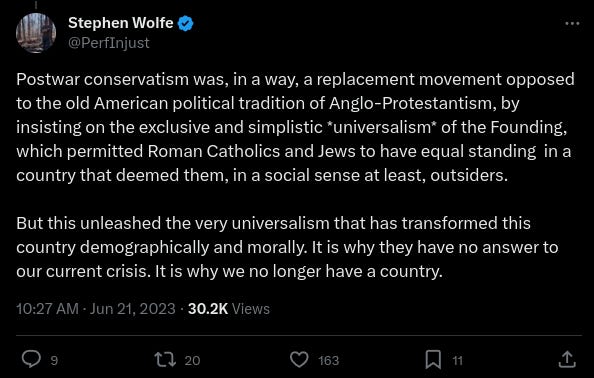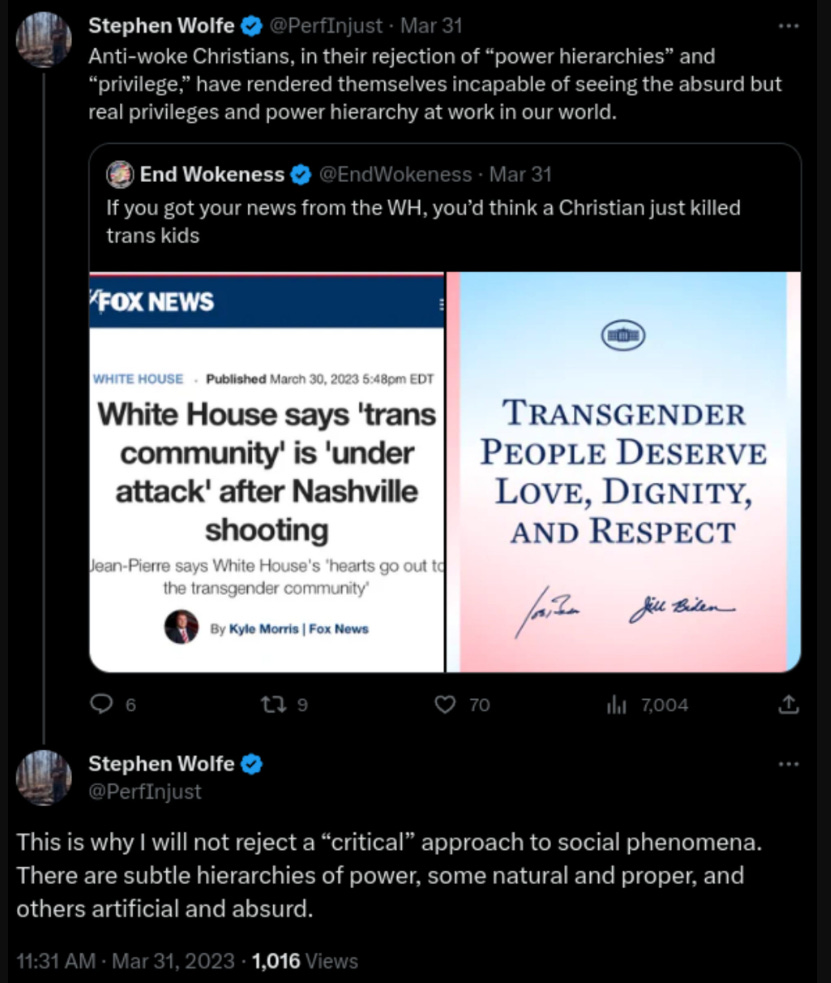"The Postwar Consensus" as Christian Nationalism's Hegemonic Narrative
Something you will come across quite often in Christian Nationalist circles is heated opposition to “the postwar consensus.” The change in American worldview that came in the wake of World War II and the Holocaust is framed as having infected the minds of conservative Christians, causing them to champion “losing with dignity,” and nefariously preventing them from properly seizing worldly political power for their own gain. Nobody in this world is more prolific in his opposition to the postwar consensus than the author of The Case for Christian Nationalism, Stephen Wolfe.

To Christian Nationalists, there are few unsavory concepts that cannot be presented as, in actuality, positives wrongly suppressed by the postwar consensus. Below is Wolfe making a textbook turn-of-the-century Nativist and second Klan (1920s) argument that Catholics and Jews pave the way for demographic replacement of the true American, “Anglo” ethnicity, shoehorning opposition to this position into the rubric of “postwar conservatism.” To the original, prewar proponents of this idea, “Anglo” was not just a cultural designation; Europe was divided into separate “races,” such as Anglo/Teutonic/Nordic, Alpine and Mediterranean, using pseudo-scientific tools like phrenology (see: William Ripley's The Races of Europe: A Sociological Study, published in 1899). Wolfe confirms this as his framing when he writes that author Jack London “affirmed that America was and ought to keep this dominant ethnicity” of “Anglo-Protestant.” London was a well-known devotee to the racial theory of Ripley and others.
Thus, to the Christian Nationalist, the postwar consensus serves the same purpose that a “hegemony of white supremacy” does within Critical Race Theory and a “hegemony of heteronormativity” does within Queer Theory. Just as “the theories” piggyback upon Antonio Gramsci’s cultural hegemony to claim that oppressor narratives infiltrate the minds of their particular oppressed group to such a degree that members often promote their own oppression, Christian Nationalists claim the postwar consensus of “secular liberal democracy” has infiltrated the minds of Christians, causing them to perpetuate their own demise. In fact, Wolfe openly embraces a “‘critical’ approach to social phenomena” and “real privileges and power hierarchy at work in our world.” This, in and of itself, is not a false view—white supremacy, heteronormativity and the postwar consensus are real phenomena, and the notion of cultural hegemony has much truth to it—but Wolfe takes the premise to the exact same ends as the theories, by dismissing all dissent as an ingrained hegemonic narrative.
Whether knowingly or unknowingly, others in the Christian Nationalist orbit play in the same games as Wolfe. I know these games well, because they are a tactic all too often used by Christian Nationalists against me. Nate Fischer, CEO of New Founding and Chairman of American Reformer (which regularly publishes Wolfe), claims that I am “working for the same goal as [libertarian columnist] David French” and that my “purpose in life is to smear the church.” Is he doing anything other than dismissing my dissent to him starting a business with a Nazi pornographer, by claiming I perpetuate the hegemonic narrative of the postwar consensus? When a SBC pastor and editor of The Statement on Christian Nationalism and the Gospel, Jeff Wright, announces that I am a secret federal agent and “probably demon possessed,” because I criticize him for defending abhorrent opinions on ethnicity among his allies, is he saying anything other than he believes I belong to the ultimate hegemony?
In the end, the most prominent voices in Christian Nationalism are trafficking in the same narratives as their supposed woke adversaries. In this they are no different than communists and fascists, who consider each other to be mortal enemies while drawing their worldviews and action plans from the same philosophic well of 19th-century European labor movements.








What is CREC?
This is fascinating and stomach-wrenching stuff. Wolfe and his cohorts display in the comments you share an extraordinary ignorance of the history of intellectual thought and church history since the 18th century. It’s nonsense. Not sure how you debate fruitfully with folks with such outlandish claims and ignorance. I’m curious where you see these ideas gaining traction? Any particular ecclesial setting? Or just the Twitterverse?